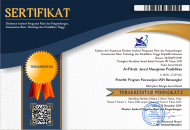Development of an Adaptive Higher Education Management Model with Artificial Intelligence
Abstract
Keywords
Full Text:
PDFReferences
Acikkar, M., & Akay, M. F. (2009). Support vector machines for predicting the admission decision of a candidate to the School of Physical Education and Sports at Cukurova University. Expert Systems with Applications, 36(3), 7228–7233. https://doi.org/10.1016/j.eswa.2008.09.007
Adamson, D., Dyke, G., Jang, H., & Rosé, C. P. (2014). Towards an Agile Approach to Adapting Dynamic Collaboration Support to Student Needs. International Journal of Artificial Intelligence in Education, 24(1), 92–124. https://doi.org/10.1007/s40593-013-0012-6
Agaoglu, M. (2016). Predicting Instructor Performance Using Data Mining Techniques in Higher Education. IEEE Access, 4, 2379–2387. https://doi.org/10.1109/ACCESS.2016.2568756
Alamri, H., Lowell, V., Watson, W., & Watson, S. L. (2020). Using personalized learning as an instructional approach to motivate learners in online higher education: Learner self-determination and intrinsic motivation. Journal of Research on Technology in Education, 52(3), 322–352. https://doi.org/10.1080/15391523.2020.1728449
AL-Fayyadh, H. R. D., Ganim Ali, S. A., & Abood, Dr. B. (2021). Modelling an Adaptive Learning System Using Artificial Intelligence. Webology, 19(1), 01–18. https://doi.org/10.14704/WEB/V19I1/WEB19001
Ali, M., & Abdel-Haq, M. K. (2021). Bibliographical Analysis of Artificial Intelligence Learning in Higher Education: Is the Role of the Human Educator and Educated a Thing of the Past? In M. B. Ali & T. Wood-Harper (Eds.), Advances in Educational Technologies and Instructional Design (pp. 36–52). IGI Global. https://doi.org/10.4018/978-1-7998-4846-2.ch003
Avisyah, G. F., Putra, I. J., & Hidayat, S. S. (2023). Open Artificial Intelligence Analysis using ChatGPT Integrated with Telegram Bot. Jurnal ELTIKOM, 7(1), 60–66. https://doi.org/10.31961/eltikom.v7i1.724
Barredo Arrieta, A., Díaz-Rodríguez, N., Del Ser, J., Bennetot, A., Tabik, S., Barbado, A., Garcia, S., Gil-Lopez, S., Molina, D., Benjamins, R., Chatila, R., & Herrera, F. (2020). Explainable Artificial Intelligence (XAI): Concepts, taxonomies, opportunities and challenges toward responsible AI. Information Fusion, 58, 82–115. https://doi.org/10.1016/j.inffus.2019.12.012
Ben-Daya, M., Hassini, E., & Bahroun, Z. (2019). Internet of things and supply chain management: A literature review. International Journal of Production Research, 57(15–16), 4719–4742. https://doi.org/10.1080/00207543.2017.1402140
Bharara, S., Sabitha, S., & Bansal, A. (2018). Application of learning analytics using clustering data Mining for Students’ disposition analysis. Education and Information Technologies, 23(2), 957–984. https://doi.org/10.1007/s10639-017-9645-7
Demircioglu Diren, D., & Horzum, M. B. (2022). Artificial Intelligence Based Adaptive Learning Model for Distance Learning Readiness. In D. Ifenthaler & S. Seufert (Eds.), Artificial Intelligence Education in the Context of Work (pp. 139–154). Springer International Publishing. https://doi.org/10.1007/978-3-031-14489-9_8
Ertefaie, A., Small, D. S., & Rosenbaum, P. R. (2018). Quantitative Evaluation of the Trade-Off of Strengthened Instruments and Sample Size in Observational Studies. Journal of the American Statistical Association, 113(523), 1122–1134. https://doi.org/10.1080/01621459.2017.1305275
Faculty of Education, University of Osijek, Cara Hadrijana 10, 31 000 Osijek, Croatia, & Đurđević Babić, I. (2017). Machine learning methods in predicting the student academic motivation. Croatian Operational Research Review, 8(2), 443–461. https://doi.org/10.17535/crorr.2017.0028
Ferguson, R. (2012). Learning analytics: Drivers, developments and challenges. International Journal of Technology Enhanced Learning, 4(5/6), 304. https://doi.org/10.1504/IJTEL.2012.051816
George, B., & Wooden, O. (2023). Managing the Strategic Transformation of Higher Education through Artificial Intelligence. Administrative Sciences, 13(9), 196. https://doi.org/10.3390/admsci13090196
Gligorea, I., Cioca, M., Oancea, R., Gorski, A.-T., Gorski, H., & Tudorache, P. (2023). Adaptive Learning Using Artificial Intelligence in e-Learning: A Literature Review. Education Sciences, 13(12), 1216. https://doi.org/10.3390/educsci13121216
Khan, M. A., Khojah, M., & Vivek. (2022). Artificial Intelligence and Big Data: The Advent of New Pedagogy in the Adaptive E-Learning System in the Higher Educational Institutions of Saudi Arabia. Education Research International, 2022, 1–10. https://doi.org/10.1155/2022/1263555
Miller, T. (2019). Explanation in artificial intelligence: Insights from the social sciences. Artificial Intelligence, 267, 1–38. https://doi.org/10.1016/j.artint.2018.07.007
Otter, D. W., Medina, J. R., & Kalita, J. K. (2021). A Survey of the Usages of Deep Learning for Natural Language Processing. IEEE Transactions on Neural Networks and Learning Systems, 32(2), 604–624. https://doi.org/10.1109/TNNLS.2020.2979670
Otto, F., Kling, N., Schumann, C.-A., & Tittmann, C. (2023). Conceptual Approach to an AI-Based Adaptive Study Support System for Individualized Higher Education. International Journal of Advanced Corporate Learning (iJAC), 16(2), 69–80. https://doi.org/10.3991/ijac.v16i2.35699
Sajja, R., Sermet, Y., Cikmaz, M., Cwiertny, D., & Demir, I. (2023). Artificial Intelligence-Enabled Intelligent Assistant for Personalized and Adaptive Learning in Higher Education. https://doi.org/10.48550/ARXIV.2309.10892
Sondak, N. E., & Sondak, V. K. (1989). Neural networks and artificial intelligence. Proceedings of the Twentieth SIGCSE Technical Symposium on Computer Science Education, 241–245. https://doi.org/10.1145/65293.71221
Taufiqurrahman, M. (2022). Implementasi Pembelajaran Berbasis ICT Sebagai Upaya Perguruan Tinggi Menghadapi Era Smart Society 5.0. PROGRESSA: Journal of Islamic Religious Instruction, 6(2), 114–132. https://doi.org/10.32616/pgr.v6.2.426.114-132
Tjahjawulan, I. (2019). Bagaimana Pendidikan Tinggi Seni Indonesia, Khususnya Institut Kesenian Jakarta Menghadapi Revolusi Industri 4.0? Jurnal Seni Nasional Cikini, 5(2), 60–71. https://doi.org/10.52969/jsnc.v5i2.82
Wahyudi, W., & Sunarsi, D. (2021). Manfaat penerapan manajemen pengetahuan bagi kinerja dosen di masa pandemi Covid-19. JPPI (Jurnal Penelitian Pendidikan Indonesia), 7(2), 285–291. https://doi.org/10.29210/020211155
Zawacki-Richter, O., Marín, V. I., Bond, M., & Gouverneur, F. (2019). Systematic review of research on artificial intelligence applications in higher education – where are the educators? International Journal of Educational Technology in Higher Education, 16(1), 39. https://doi.org/10.1186/s41239-019-0171-0
DOI: http://dx.doi.org/10.31958/jaf.v11i2.12121
Refbacks
- There are currently no refbacks.
Copyright (c) 2023 Fenny Indriastuti, Abdul Sahib, Rini Nuraini

This work is licensed under a Creative Commons Attribution-NonCommercial 4.0 International License.
__________________________________________________________________________
 | Al-Fikrah: The Journal of Educational Management |
Creations are disseminated below Lisensi Creative Commons Atribusi-NonKomersial 4.0 Internasional.













